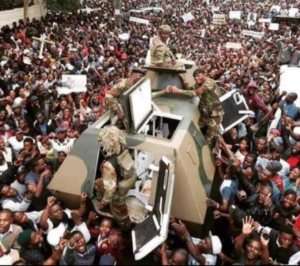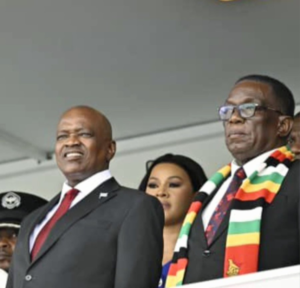A TURN OF TIDES IN ZIMBABWE: VP CHIWENGA AND MILITARY HALT MNANGAGWA’S THIRD TERM ASPIRATIONS

In a dramatic turn of political events that has sent shockwaves through Zimbabwe’s corridors of power, Vice President Constantino Chiwenga, with the backing of the military, has effectively blocked President Emmerson Mnangagwa’s ambitions for a third term in office. This political maneuvering has forced President Mnangagwa to publicly abandon any intentions of circumventing the constitution to extend his rule, bowing to pressure from his supporters and internal dissent within the ranks of his own administration.
President Mnangagwa, who came to power in a coup that ousted long-time ruler Robert Mugabe in 2017, had previously sidestepped the military’s influence in last year’s general elections. Instead, he leveraged the Central Intelligence Organisation (CIO) and its associated entity, Forever Associates Zimbabwe (FAZ), to secure his electoral victory. This move was seen as an attempt to curb potential internal sabotage but raised concerns over the legitimacy and transparency of the electoral process.
Military commanders, who had remained relatively silent in the public eye, were reportedly discontent with Mnangagwa’s reliance on the CIO and FAZ. Behind closed doors, they were determined to halt the President’s maneuvers to extend his stay in office beyond the constitutional limits.
The crux of the matter came to a head when Chiwenga, a figure of considerable influence within both the military and political landscapes, began to assert his presence and intentions more aggressively. The appointment of his close ally, Lieutenant-General Anselem Sanyatwe, as the commander of the Zimbabwe National Army signaled a clear shift in power dynamics. This move was particularly significant given that Mnangagwa had previously dispatched Sanyatwe to Tanzania in an apparent attempt to dilute his influence following the 2017 coup.
Chiwenga’s political ambitions became unmistakably apparent during his high-profile wedding last December, where his posture and rhetoric seemed to position him as a leading contender for the presidency. Despite this, Mnangagwa continued to explore avenues to secure a third term, using proxies and attempting to manipulate public opinion and party mechanisms to his advantage.
The campaign for Mnangagwa’s third term was initially aggressive, with the President himself hinting at a desire to remain in power until 2030. However, as opposition to this idea within the political sphere and the general populace became more pronounced, the campaign’s momentum faltered. Recognizing the potential for political fallout, Mnangagwa made a strategic retreat, positioning himself as a proponent of constitutional adherence and the rule of law.
In an exclusive interview with “Brick by Brick” magazine, Mnangagwa vehemently denied any ambitions for a third term, emphasizing his respect for democratic principles and constitutional boundaries. He highlighted the absence of any move by his party, Zanu PF, that would contravene the constitution, particularly regarding presidential term limits.
According to Zimbabwe’s constitution, any attempt to extend presidential term limits would require a significant amendment process, including achieving a two-thirds majority in both houses of parliament and potentially a referendum. This process is further complicated by provisions that prevent any incumbent from benefitting from such constitutional amendments, ensuring that any changes would only apply to future presidents.
This saga reflects the complex interplay of power, ambition, and constitutional governance in Zimbabwe. As Mnangagwa concedes to the limits of his term in office, the focus shifts to the future of Zimbabwe’s leadership and the role of democratic institutions in safeguarding the nation’s governance. Chiwenga’s rising influence, supported by the military, sets the stage for a new chapter in Zimbabwe’s political narrative, with implications for the country’s democratic trajectory and the balance of power within its ruling structures.



